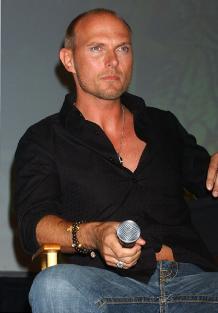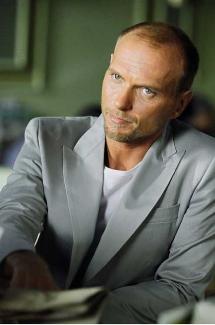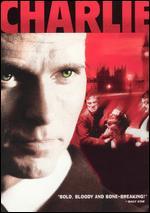|
Find interviews by: | ||
Luke Goss (Part 2) Jump straight to Part 3 of this interview or go back to Part 1
"I can’t believe how much he trusts me. He hasn’t really even given me acting lessons, it’s more blocking sometimes. He’s been very, very, very generous about trust and judgements calls. I was thinking this yesterday: let’s see what happens - and we ended up going with it. In my delivery on the mountain I go from absolute range to nothing, to real restraint and control of the conversation, just to show that he does have the power of self-control. People don’t want to see the monster and hate him. People who tune in and love the story of Frankenstein will really like it." I think that’s a problem nowadays. People think Frankenstein's creation is Herman Munster, but you look like the book's description. Muscular but tall and thin. "He’s meant to be very strong. I’ve just finished a movie where I’ve been fighting Michelle Yeoh and I’ve been trained by masters so I can press 200-odd pounds. I’m very strong. But the look is actually quite true to the book. This idea was mine, when you see him like this. It’s deliberate, because I’ve said - it’s not on record in the book or anywhere - it’s one of the most sacrilegious things anyone can do. This looks like a shroud; it’s deliberately unstained, there’s no blood, that’s deliberate. I didn’t want to do this [holds hands out]. One of the conceptual things; I said I don’t want that, if I want any empathy from anybody it’s never going to happen if you do that. Let’s use visual poetry to try and get that. “So I suggested an idea in the scene where I’m holding Elizabeth. She’s limp so she’s obviously dead, but I’m looking at her with a look of longing. That’s not just: he can’t have her because she’s no longer animated in life. He couldn’t have her anyway. A lot of us have seen a woman across a room that you would want, in a dream, to have but she’s, in that horrible modern-day expression, out of your league. I have experienced people saying: bullshit, you’re an actor, you used to be a musician. But without wearing a name-tag and without going over there and introducing myself and giving her my resume; if I went over there, just a scruffy guy in a pair of jeans and she didn’t recognise me, then she might not have the time of day for me either. Without knowing my resume and seeing my account book! “I see people all the time who are painfully shy and don’t have any way to bypass that. I wanted to show what he couldn’t have. There are very poetical moments in this story and there’s almost a kind of religious connotation to it. I’m such a bloody fan now. I liked it before, like everybody else did, but now I’m genuinely amazed at how profound the writing is, how relevant it is. As I said before, it’s more relevant now than probably when it was written."
"I was asked to do that. I’d been asked to do West End before. I said to my management, this is kind of a big leap. I’m being asked to do this because of who I am, not because of what I’m capable of doing. I’d just written a book at that point which was a bestseller and got great, great reviews. I said, sure writing a book can’t be compared to the fame I had but it’s still me. I’m very proud of that first little contribution that I’ve individually made without my brother being involved or Craig or anybody; it was just me. I’m proud of it. “It’s somewhat academic because I involved myself somewhat cerebrally on a very honest, candid level. I didn’t put any vanities in there. I employed censorship on other people’s behalf because I didn’t think it was right to mention names, but I still told the story without being specific with names. I put the censorship in after I wrote it. In the end I decided not to censor the book. I decided to take the names out and show myself as vulnerable as I was at the time. “So then when I did theatre, Marina Caldoni, the resident director at the time of the Queen’s Theatre in Hornchurch, said to me, ‘You’ll be right for this.’ I said, ‘Look, I’ve not done it before. It’s a great experience but I don’t know whether I’d be able to do it.’ So she said let’s just talk, let’s try out a few things. So we tried a few lines, we tried a few scenes. She really liked it and I had a few private coaches. I continued that for many years, one on one. But then I did an interview, strangely enough, the only person I’ve ever interviewed in my life. Sitting in the same position as you but the other way round. And that was Michael Caine. Because they asked me would I do this interview and I said there’s only two people I want to interview, and that’s Clint Eastwood or Michael Caine. They said okay, and an hour later they called back and said, ‘Michael has agreed to do it.’ I was like, ‘Oh shit...’" For TV? "Yes. So I interviewed him. I asked him, I said can we have a talk before, because I’ve not done this, so he said, ‘Sure, come to the office.’ The office being his bar, the bar in the restaurant that he owns. So we went there and he was everything that I’d dreamed he would be. He said to me, ‘You know what? If you want to do it, and you’re curious, then jump in. Away you go.’ No snobbery, no aloof kudos. My acting coach, Jenny McCracken, gave me the best direction ever. She said, ‘You’re a natural actor. Trust your instincts because your instincts are honest. Every time you question them, you’re off. So trust your instincts.’ That was the best advice I’ve ever been given. So I did Plan Nine through an offer, again. I was asked to do it." Were you familiar with the film? "Yes. Ed Wood, with Johnny Depp. I’d watched the movie Ed Wood, strangely enough, a few weeks before. Such a stupid amount of time before. I watched the movie as a result of doing the show. I became very, very familiar with Ed Wood and all his work. I can’t help digressing, I’m so enthusiastic about things. But I think Ed Wood was the Tarantino of his day, though he didn’t have the budget. People say, ‘Don’t you think he was a crap actor?’ No, he was a great actor. He made films for nothing, and you can’t actually make a film for free. You can’t do it. It’s physically impossible. “People say, ‘What about continuity? Day and night?’ Well, absolutely, but it was either that or not make the movie. The man was not going to be compromised: ‘I am a movie director.’ I actually got tearful watching the movie at times because his resolve was so incredibly motivating. God bless Ed Wood because he was going to make that movie regardless of anything put in front of him. Even, who knows if his ability was not worthy of being a movie director." He believed in himself. "We’re still sitting here right now, talking about the guy. Kudos to that. You’ve got to take your hat off to that. Because he had a great idea about these mad films. He didn’t have the technology at his disposal, he didn't have the budget, he had nothing. He didn’t even have actors. He had to resort to the church to get funding. So I think he was like the Tarantino of his day, or I optimistically think of him in that way. I don’t know whether he ever would be, but maybe with the budget and some belief he could have made a great movie."
"I did an independent English film first. I did Two Days, Nine Lives, which was a big, big learning curve for me because I was filming during the day and then doing theatre at night. That movie was written and directed by a guy called Simon Monjack who was a big workshop fan. He would put us into the scene and he would walk around. If we weren’t saying anything specific, we would sit around in group therapy on the set. He would say, ‘So, Saul’ - I was playing the lead in this film - ‘What do you think of Star?’ ‘I think she’s an arrogant bitch,’ - and she would be all, ‘Fuck off, Saul.’ ‘He would say, ‘Why does he think that?’ She would say, ‘I don’t care.’ He would evoke questions and it would perpetuate and perpetuate, very heavy. People would say stuff and we would all be in the zone. Cameras at the ready, and then, ‘Okay, let’s shoot this scene.’ “A great benefit of low-budget films - this was about a million quid - is that you have that luxury of spending that kind of time before a big scene. Which you don’t in Hollywood with studio pictures,because you’ve got producers and line producers breathing down your neck, trying to bring things in on budget. We didn’t have a fucking budget! It’s like a glider: what have you got to worry about? The engine’s not going to foul. The wings could fall off - it’s unlikely - but there is no engine. You start flying without an engine." From there you went to Blade 2 and now this. "Well, ZigZag was first. I’d filmed ZigZag before Blade 2. That was John Leguizamo, I’m a massive Leguizamo fan, Oliver Platt, who I love, Natasha Leone, Wesley Snipes and myself. I did ZigZag in Hollywood first, which was filmed in Hollywood on location. So that was my Hollywood break. That was written and directed by David Goyer, and he called Guillermo. I had been given the script for Blade 2 the day before, by coincidence. I had read for David Goyer and a few people from Franchise, and they called me after an hour and a half and offered me the role, from the audition. “I actually auditioned for that. It was written for a Hispanic character and I did it in American. I walked in and said, ‘Hey, how are you?’ He said, ‘You have a great voice.’ I said, ‘Thank you, I got it for free.’ Afterwards, he said, ‘Could I hear it in English? Do you mind?’ I went, ‘Er, okay.’ To most people that sounds easy, but I’d never done it in English. There’s this one line in the film where I say, ‘You know what it’s like running this. You need a goddam computer to schedule round these fucking menstrual cycles.’ I just went heavy on the phrase ‘fucking menstrual cycles’ and I came back down and I composed myself. He said, ‘Have you finished yet?’ I’d completely zoned out, and he loved this. It was in English but he loved it, and an hour and a half later they offered me the movie. “Working with those people was like: oh man! Then I had a phone call saying that David Goyer had said, ‘I think we’ve found our Nomak.’ They’d been trying to find it for a long time, to find someone who could stand up to Snipes visually and with the dialogue. I was asked to come in, but I didn’t technically audition for that role. I met with Guillermo. We talked very, very candidly about the character, with loads of enthusiasm, like two kids in a candy store. I love Guillermo’s work, I love his ways and I love him as a man. He’s a very generous man which makes him an incredibly generous director. And his enthusiasm, his childlike manner, combined with his ability to control a ship, as in a hundred million dollar movie, without even blinking - it’s just incredible. “He said, ‘I think you could be fucking great for this movie.’ I said, ‘What do you mean?’ He said, ‘It’s not my decision, but I think you’d be fucking good for this movie.’ A lot of people had cast approval on that character, including Wesley. But I got the role. I got the phone call that said, ‘It’s yours’ and I was one happy motherfucker! Because I was a big fan of the first one. So I just got that through meeting. I obviously had to read for the casting people because there’s a political thing there, and a respect because they’re good at what they do. I had to read for them, and I got offered the role."
"There’s Charlie as well, which I think is going to be put out by Warner Bothers. No-one knows that yet, but Warner Brothers want the movie badly. A couple of big companies, the people who took Blade, want it. You know Peter Yates, the director of Bullitt? He’s gone on record as saying it’s the most honest gangster movie he’s ever seen. It was reviewed recently, saying, ‘Forget The Krays, this is going to be the one English classic gangster cult movie.’ It’s got the most glowing reaction. the movie’s called Charlie and in a 94-minute movie I’m in about 89 minutes of the film. “There is no good guy or bad guy. I play Charlie Richardson who’s still alive. It’s about Charlie Richardson, it’s set in the 1960s. It’s the true story of his life: the trial, everything. He had business in London and Africa; it’s shot in London and Africa. A sixties period piece. A full-on gangster movie. And Peter Yates’ son edited the movie. It’s just been received with open bloody arms, man. I saw it at a private screening about three weeks ago, and I’m in every scene. But it’s just a bloody good gangster film. If you like The Long Good Friday... I’ve just been offered The Long Good Friday 2 as well, they’re making another one. I don’t know if people know that. But I’ve just been offered that as a result of doing Charlie. I’ve been offered a film called Cold and Dark because of Charlie. There’s another movie that’s filming in Egypt with Stanley Kubrick’s cinematographer who did Full Metal Jacket; they’ve just offered me that film. And another movie called Shadow Dragon, an amazing script, another genre film. The lead guy is, not like Blade but that kind of role, a stoic superhero. Very, very powerful, very cool. They want me to do that." Continue to Part 3 of this very long interview, where Luke discusses Silver Hawk and the role he didn't get in Daredevil. Or go back to Part 1 where he talks about landing the Frankenstein role and how it compares with Blade 2. | ||

 It sounds like Kevin has given you a lot of freedom to find the character.
It sounds like Kevin has given you a lot of freedom to find the character. Let’s go back to the start of your acting career, on stage in
Let’s go back to the start of your acting career, on stage in  You were doing stage work,
You were doing stage work,  Is there any sort of plan to your acting career?
Is there any sort of plan to your acting career?